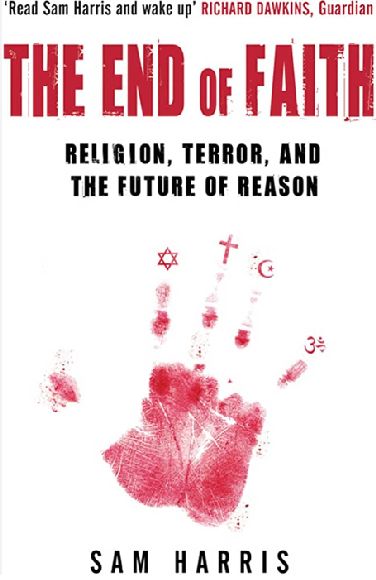
The End of Faith: Religion, Terror, and the Future of Reason is a brilliant piece written by Sam Harris in 2004. Samuel Benjamin Harris (1967) is an American philosopher, neuroscientist, and an author.
This book presents a stark difference between “faith” and “reason”. A profound stuff that is needed to be heard.
Similar motif was also seen in Richard Dawkins’ famous book, The God Delusion.
Why do religious ideas often look up to a unique level of respect?
These ideas, are also exempted from scrutiny in many societies. While other ideas and beliefs are subject to critical examination, religious ideas are often treated with a certain degree of reverence. In fact, they are granted a “free pass” from rigorous questioning or critique.
Why? Just because they are ancient, so “holy”?
Nevertheless, Harris, highlights the importance of empirical evidence, reason, and critical thinking in our quest for knowledge.
In this book, he emphasizes the value of scientific exploration and the scientific method as a reliable and effective tool for understanding the natural world and uncovering truth.
He adds that scientific inquiry should not be limited to studying only the physical aspects of reality but should also encompass the examination of subjective experiences, including those associated with spirituality. But first, he starts with the concept of belief systems that is ubiquitous across all religions.
The concept of belief systems
Harris explores the concept of belief systems that form the actions of individuals throughout their lifetime. Irrespective of any religion, an individual acquires certain “beliefs” from their influential figures early in life.
Like skin, it forms the outer layer for people’s thought process. They tend to hold on to their beliefs and are reluctant to let them go easily.
Over time, these beliefs shape a person’s worldview, and within that framework, religious faith becomes a significant aspect.
To illustrate the impact of beliefs on our lives, Harris presents two historical events:
- the inquisition “The Holy Inquisition formally began in 1184 under Pope Lucius III, to crush the popular movement of Catharism” (pg. 83)
- the holocaust “The Holocaust marked the culmination of German tribalism and two thousand years of Christian fulminating against the Jews. Reason had nothing to do with it.”
Both demonstrate how malevolent belief systems can cause immense harm and suffering to innocent individuals.
These examples serve to emphasize the destructive power of harmful beliefs. Along with the importance of critically examining and re-evaluating our own beliefs for the sake of our peace and the well-being of others.
The problem with Islam
Harris then focuses on Islam and discusses the concept of jihad as a major point.
He acknowledges that some apologists interpret jihad as a personal struggle. However, he warns about those who interpret it as a holy war against non-Muslims, considering them infidels or apostates.
“A peep into the literature of the hadith elaborates:
Jihad is your duty under any ruler, be he godly or wicked.
A single endeavor (of fighting) in Allah’s Cause in the forenoon or in the afternoon is better than the world and whatever is in it.
A day and a night fighting on the frontier is better than a month of fasting and prayer.
Nobody who dies and finds good from Allah (in the Hereafter) would wish to come back to this world even if he were given the whole world and whatever is in it, except the martyr who, on seeing the superiority of martyrdom, would like to come back to the world and get killed again (in Allah’s Cause).
He who dies without having taken part in a campaign dies in a kind of unbelief. Paradise is in the shadow of swords.” (pg. 112)
What is morality?
In the subsequent portion, Harris moves beyond religion and towards a scientific understanding of good and evil.
His argument revolves around defining morality. He thinks that instead of relying on ancient religious texts, morality must be based on its impact on the happiness or suffering of others in the present time.
He rejects moral relativism and pragmatism, instead appealing to moral facts that can guide us in promoting happiness and minimizing pain.
He also questions the ethical boundaries of pacifists who, despite facing unscrupulous enemies, choose not to employ lethal force for the sake of defending the innocent.
Consciousness as rational foundation for spirituality
In the concluding section, Harris proposes a rational foundation for spirituality by examining the concept of self.
He conducts an exploration through various experiments and thought experiments. One of the key aspects of this exploration involves investigating different states of consciousness that can be attained through meditation and other practices.
Harris suggests that one can gain insights into the nature of consciousness by practising mindful meditation. Through focused attention and introspection, individuals may be able to experience shifts in their perception and gain a deeper understanding of the self and the workings of the mind.
Additionally, Harris acknowledges that by using certain substances, like psychedelics, people do experience an alteration in their conscious reality. These substances, he thinks, are tools that have the ability to provide unique insights into the nature of consciousness and reality.
By altering the ordinary functioning of the brain, these substances may open doors to novel perspectives and experiences, allowing individuals to explore different dimensions of consciousness.
He encourages readers to question their preconceived ideas about the nature of consciousness and explore the potential for transformative experiences that lie beyond our ordinary states of awareness.
Of course, he no-where recommends to consume any drug/substance but his approach is that of self-inquiry and introspection.

Takeaway
The aim of this book is to put relationship between humans, religions, and faith on table.
Although, on the surface the book might appear as a direct attack on religions in general. However, this isn’t the case. Sam Harris is standing up against bad ideas, redundant (religious) dogmas and rituals that doesn’t make any sense.
He asserts that the shield of untouchability surrounding religion hinders intellectual progress. And obstructs necessary conversations about the validity of religious claims and their impact on society.
By challenging the exceptional treatment of religious ideas, Harris aims to promote a more open and critical examination of religious beliefs and practices.
There could be multiple perspectives when considering the relationship between humans, religions, and faith. And I feel, by having open discussions, common grounds based on facts can be achieved.
When it comes to religion, I couldn’t agree more with Sam Harris,
“The only angels we need invoke are those of our better nature: reason, honesty, and love. The only demons we must fear are those that lurk inside every human mind: ignorance, hatred, greed, and faith, which is surely the devil’s masterpiece”.
This is one of the best thesis that helps us in igniting the fire of questioning our belief systems. I highly recommend this book.



